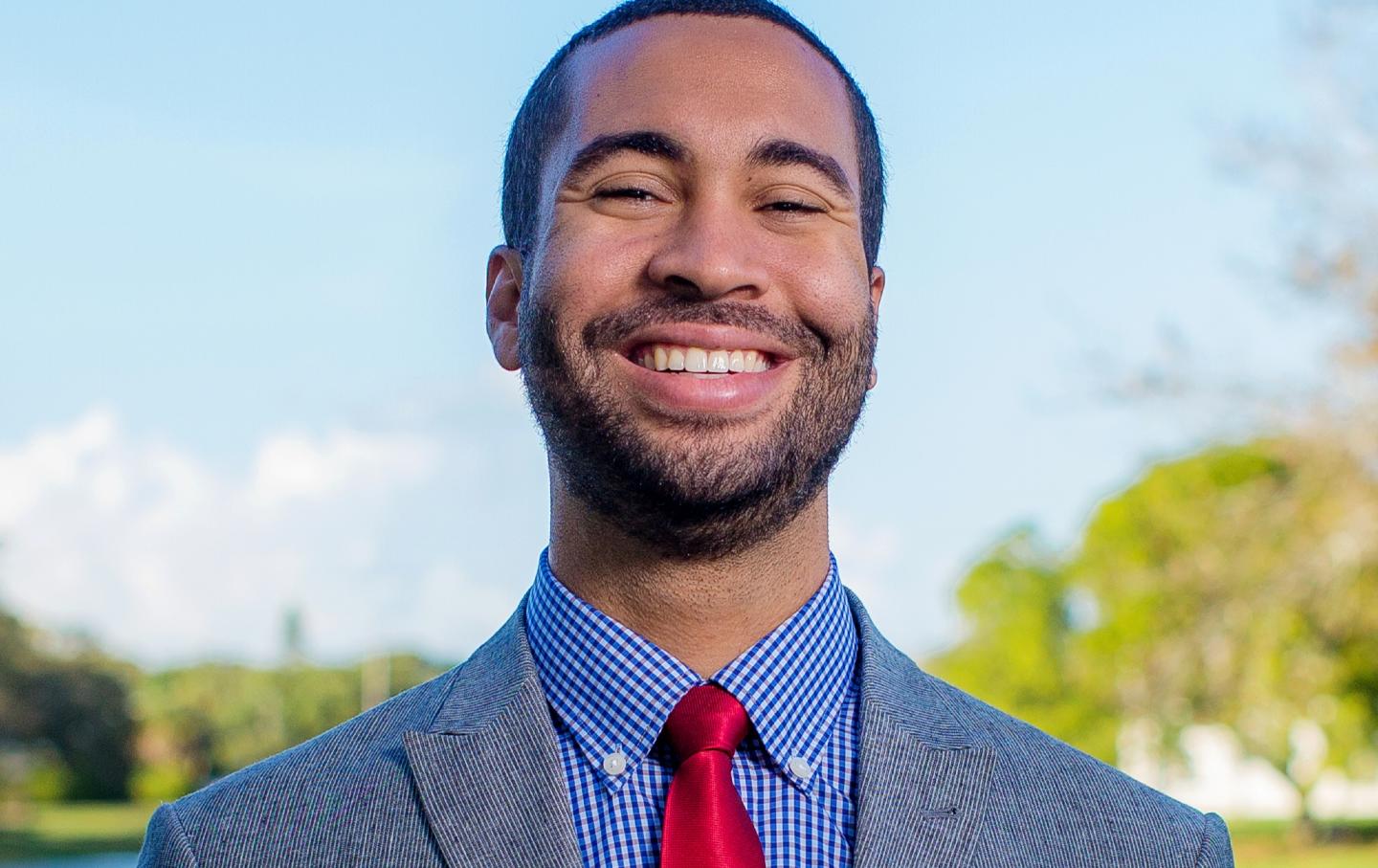Florida Socialists Are Here to Stay. Just Ask Richie Floyd.
Despite Republican lawmakers warning them to stay out of the state, this Florida city council member represents a growing contingent of Sunshine State socialists.

St. Petersburg, Fla.—If any city in Florida were going to elect a socialist, it’d be St. Petersburg. The Gulf Coast city, abutting Tampa, has always been an anomaly: a liberal enclave, with about 32,000 more registered Democrats than Republicans and the largest Pride parade in the Southeast. In the same month that registered Republicans overtook registered Democrats statewide, St. Pete voters elected their first Black mayor, first Hispanic City Council member, and 32-year-old Richie Floyd.
He’s the youngest person ever elected to the St. Petersburg City Council, the first Black council member to represent a district in the city’s predominantly white northern half, and Florida’s only elected member of the Democratic Socialists of America. The way Floyd sees it, he’s tapping into a version of progressivism that Floridians want but aren’t getting from the state Democratic Party. “A message that resonates with working-class people, that doesn’t capitulate to what Republicans have to say, that doesn’t accept everything in their framing, that doesn’t shy away from being in favor of things that are good for people just because you’re worried about getting called a name—I think that that kind of politics is what’s going to win,” Floyd tells me. “And I haven’t seen that from anybody in any of the options for leadership of the party for my whole life.”
On a balmy, sunny day, Floyd and his wife, Miranda, met me at Boyd Hill Nature Preserve, a 245-acre stretch of cabbage palms, moss-draped oaks, and pine groves in the heart of St. Petersburg. We peered down a line of cages housing injured birds of prey that can’t survive in the wild. Floyd had initially suggested a fishing expedition that traced his usual kayaking routes around the white-sand barrier islands and mangrove-lined estuaries that surround the city. With Miranda in the back, probably reading, and a beer within arm’s reach, it’s what would constitute a well-spent afternoon for Floyd. But, I pointed out, “fishing takes such patience”—my polite attempt at saying I find it boring. The idea that anyone wouldn’t want to fish on a beautiful day left Floyd incredulous. I began to worry about how I’d carry a notebook and a paddle at the same time.
Algae, for once, saved the day. The toxic, fish-killing “red tide” blooms that have bedeviled Tampa Bay for years—and have only worsened with climate change—were floating from the Gulf of Mexico inland, choking Floyd’s favorite spots to catch speckled trout, redfish, and flounder. A walk in the nearby nature preserve was our backup option.
As it happens, you need patience to be a progressive politician in increasingly red Florida. During this year’s lawmaking session, which concluded on May 5, the Florida Legislature passed a slate of far-right laws, including a ban on most abortions after six weeks. It’s a catastrophic blow to access not just in Florida but across the South, which has relied on the state as a haven for access.
Before the session even began, Floyd flexed what power he had at the local level. His proposal to donate $50,000 of city money to the Tampa Bay Abortion Fund gained early support. Then, two lawmakers (whom he characterized to the Tampa Bay Times as “back-bench Republicans”) threatened to freeze funding for the city if council members followed through. “I will not cede an inch of ground to authoritarians seeking to silence dissent and erode our rights,” Floyd said at a meeting in April. Still, a five-member majority overruled Floyd and one other member.
It was a frustrating example of Floyd’s quandary. In Tallahassee, Republican lawmakers and a vengeful governor look to usurp local control at every turn. In St. Pete, an entrenched political system upholds the status quo to stay clear of the state’s wrath. “This is being a progressive politician, and even more specifically, a socialist politician, surrounded by a bunch of capitalists,” Floyd told me over the phone after our walk.
He’s not going to stop causing trouble, he said, but when I asked how he keeps up that resolve, he went silent. “It’s hard,” he said. “Sometimes, I wish I could just unplug completely for a little while like I used to when I was just an organizer, but what choice do I have?”
It’s a long game. His term doesn’t expire until January 2027. His hobbies have helped him stay sane. Fishing, of course, and jamming on his bass guitar. He recently worked out a reggae cover of a song by Trivium, a heavy metal band from Orlando. And he finds strength in community, working with other DSA members and even liberals who aren’t as progressive but see just how bad things have gotten.
For a long time, Floyd said he didn’t have the language to describe his political views. When his dad’s job on Eglin Air Force Base unionized in 2017, he celebrated with the rest of his family over the higher wages and better health care that came after. He knew he was anti-establishment. And, as a lover of trains, Floyd hated former Florida Governor Rick Scott, now a US senator. (“I think that’s pretty self-explanatory,” he said, but for the uninitiated, Scott nixed a federally funded high-speed rail project in 2011.)
His come-to-Bernie moment happened in 2015, when a cousin’s boyfriend showed him a video of the senator making his pitch for the presidency, talking about single-payer healthcare and free college. Floyd found and read every article about him that he could—many from this publication—and his feelings about the wide gulf between the way things are and the way things should be began to make sense. While studying in the United Kingdom, he watched the 2017 election play out. He began calling himself a democratic socialist.
It was a discovery so defining that Miranda could recognize it from the snippets she heard walking 50 feet ahead of us at the preserve. “I’m telling the Bernie Sanders story,” he said to her as we caught up at a trailside water cooler. “I know,” she said.
Popular
“swipe left below to view more authors”Swipe →Floyd once worked as an engineer, first at a firm in his hometown of Fort Walton Beach on the Panhandle, then at the defense contractor Honeywell, which has an office about 15 miles north of St. Pete. He had misgivings about working in the defense sector, he said, and he now looks back on his previous career with unease. “Working for a tech company that’s just sucking up venture capital,” he said. “Is that much better morally?” He quit his job and became a teacher.
Floyd taught science and engineering at a middle school. He and Miranda, who is still a teacher, became active members of the union. It was fulfilling, he said, but stressful, even more so because his first (and only) year in the classroom coincided with the pandemic. It was so stressful it caused his Crohn’s disease, which had been in remission, to flare back up. “I’m not saying this job’s not stressful at times,” he says, looking out over the skyline, “but compared to being a middle school teacher…it’s not stressful at all.”
Miranda led the way down the preserve’s main trail, beneath a canopy of oaks that spit us out into a swamp. The Willow Marsh Trail forked off to the right, but a barricade blocked the boardwalk. Floyd was bummed. “That’s the best bit!” Alligators, he said, like to hang out around there.
A bridge overlooking Lake Maggiore offered perhaps the city’s best view of the St. Pete skyline: to the east, a cluster of high-rises; to the west, the tilted saucer of Tropicana Field, home of the Tampa Bay Rays baseball team. Soon, Tropicana will be torn down, its 86-acre footprint replaced by housing, a new ballpark, and an African American history museum, a nod to the historically Black community that was razed to build the stadium. “I get to work on things I’m interested in. I get to do my best to make a place like this a better place for working people,” he said. “I mostly feel grateful when I get to look at this.”
Though the mercury was edging toward 70 degrees, Floyd wore a gray sweater. He detests the cold, he said—I felt, looking down at my own sweatshirt, a certain Floridian kinship.
More from The Nation

Donald Trump Is the Authentic American Berserk Donald Trump Is the Authentic American Berserk
Far from being an alien interloper, the incoming president draws from homegrown authoritarianism.

If Democrats Want to Reconnect With the Working Class, They Need to Start Listening to Unions If Democrats Want to Reconnect With the Working Class, They Need to Start Listening to Unions
The Democrats blew it with non-union workers in the 2024 election. Unions have a plan to get the party on message.

What Was the Biggest Factorin Kamala Harris’s Defeat? What Was the Biggest Factorin Kamala Harris’s Defeat?
As progressives continue to debate the reasons for Harris's loss—it was the economy! it was the bigotry!—Isabella Weber and Elie Mystal duke out their opposing positions.





